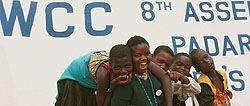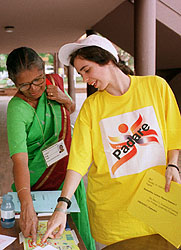Some delegates to the assembly said the most interesting and important developments of the meeting
occurred at the Padare rather than in the formal plenary discussions. Others expressed frustration
over the multitude of choices and the far-flung locations of certain events.
WCC general secretary Konrad Raiser said Council officials were "overwhelmed by the response of
churches" wanting to participate in the Padare. The goal of the Padare was, he said, "to make visible
the richness and health of the life of the churches". Rather than "simply reacting" to actions and
programmes of the WCC, Padare participants had the opportunity to "come with their contributions
to the whole life of the ecumenical movement". Raiser added that he hoped "to draw from the Padare
ideas for the WCC agenda for the future".
The wide range of subjects presented in the Padare included a number that could be and indeed have
been sensitive in many churches, including biotechnology, interfaith cooperation, sanctions against
Iraq, capital punishment, debt forgiveness for poor countries and the role of women in the church.
Homosexuality, the subject of 11 Padare offerings, was expected to be the most controversial
subject, as many churches believe it is not a legitimate topic for discussion at Christian gatherings.
Sessions such as "Church Experiences with Educational Programmes on Sexual Orientation" did
draw large numbers of participants, but did not provoke the noisy confrontations some observers had
predicted.
Before the Padare opened, Raiser said he was not afraid of controversy growing out of it. "Of course
there will be disagreements, with so many people discussing so many important issues," he said. He
noted that an advisory group had been established "to maintain the open spirit of the Padare",
adding: "This is not a place for resolutions, but for the free exchange of ideas, and sometimes they
will be controversial."


